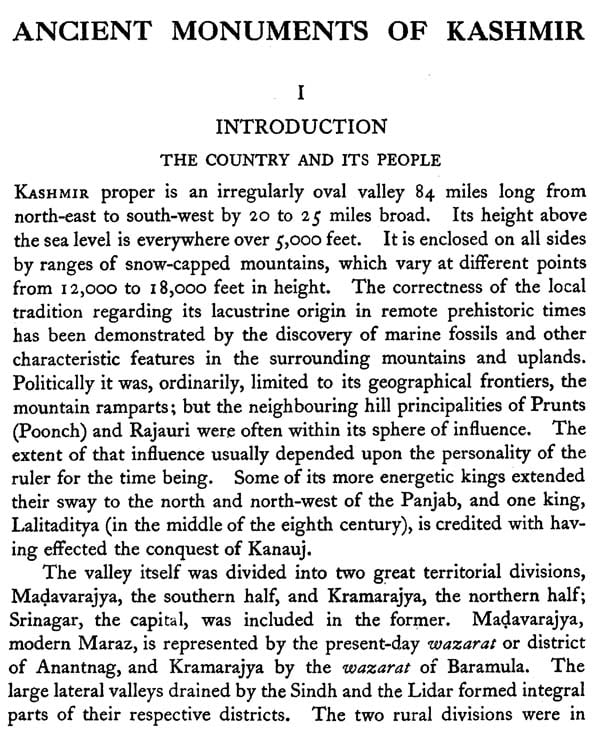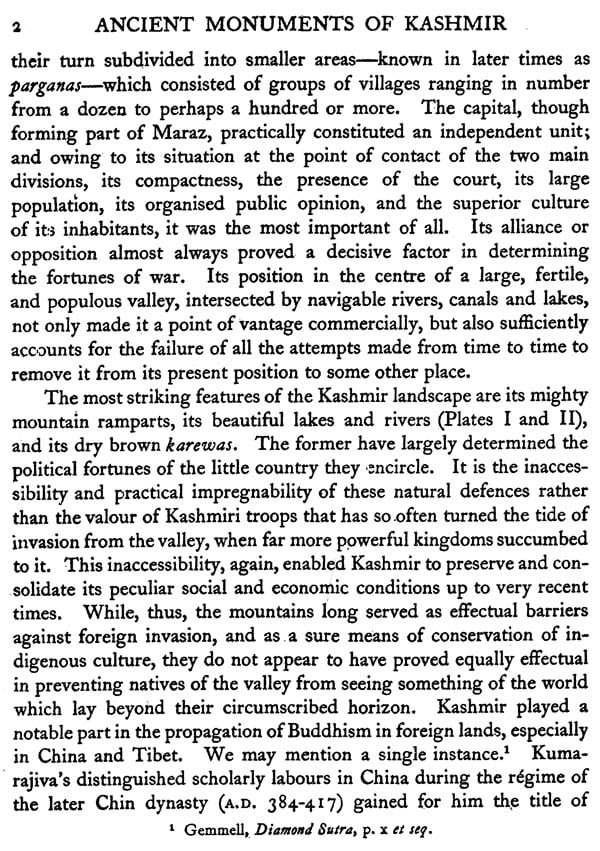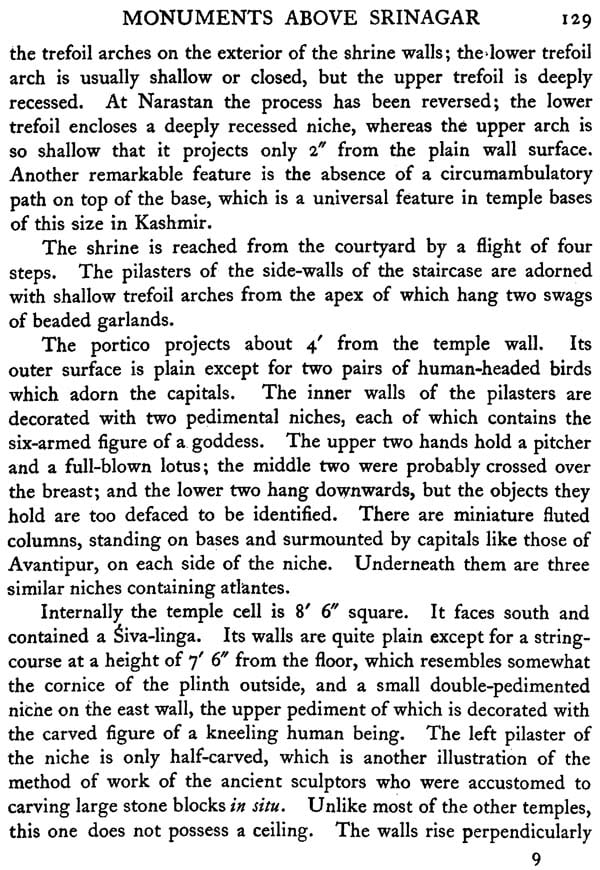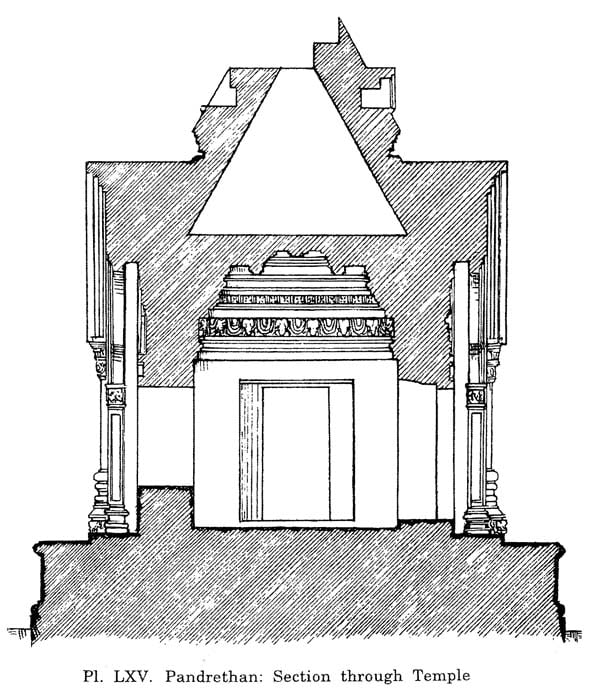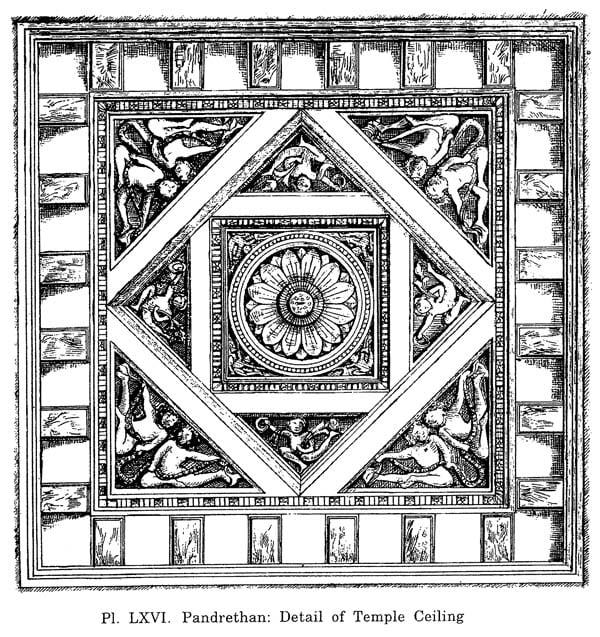
Ancient Monuments of Kashmir
Book Specification
| Item Code: | NAY904 |
| Author: | Ram Chandra Kak |
| Publisher: | Aryan Books International |
| Language: | English |
| Edition: | 2020 |
| ISBN: | 9788173051883 |
| Pages: | 250 (Throughout B/W Illustrations) |
| Cover: | HARDCOVER |
| Other Details | 9.50 X 6.50 inch |
| Weight | 680 gm |
Book Description
The location of Kashmir, its picturesque beauty and natural produce attracted foreign hordes from very early periods who left their visible imprint. Kashmir had close relationship with its neighbours particularly Ganadhara in the northwest and was an important entrepot being located on the trade route connecting Central Asia and beyond. The influence of geographical factors as well as exposure to different peoples is reflected in the ancient monuments of Kashmir which comprise both secular and religious monuments.
The present volume contains an excellent account of the architectural remains in the Valley besides the necessary background relating to the State and the people, sources, tradition and legends, political history and a discussion on architectural styles. Written with an unmatched erudition and in lucid style, this first hand account of Kashmir monuments is a work of everlasting value for the scholar and the lay person alike.
We are indebted to His Highness the Maharaja of Jammu and Kashmir, who gave the necessary permission and financial help for this valuable book to be published by the Society. It has been written by my friend Pandit Ram Chandra Kak, the recent Director of Archaeology to the State. We are very grateful to Professor Foucher for having written an introduction.
The format is handy. Condensed into 170 pages the reader will find all the general information he can reasonably desire on the geography, history, architecture and archeology of Kashmir. May we venture to regret (specialists are never satisfied) the absence in this first edition of a paragraph (which the author is eminently fitted to supply) on the popular customs and beliefs still surviving in the Valley under the official veneer of Brahmanism or Islam? No doubt these matters crop up accidentally here and there in the course of the book. But tourists would find much interest and " inspiration "-as an American would say-in hearing what the Kashmiri peasants have to tell concerning the genii, elves, and fairies with which their land abounds.
Personally, I have often thought that there remains more classic antiquity still living in the shadowy heart of the Kashmiri jungle than s of in the theatrical scenery of the Mediterranean shores. Here, too, ting vines hang from the trees; Gujar shepherds play upon their pipes at one the foot of the pine trees, just like the Sicilian shepherds in Theocritus ; at eventide pious hands place small clay lamps on the rims of tutelary Fountains, and make libations of milk and offerings of flowers to them as once were made to the Naiads; so much so that one might expect to espy through the deep thicket " the satyrs' dancing which imitates , as Alphesibaeus." For it is not true that great Pan is dead: that is only a rumour which he spread so that they would cease to pursue and to persecute him. Chased out of Arcady, the Kashmir of Greece, he found a last retreat in the lost valleys of the Himalayas, whither for Dionysos, when he took him to the conquest of India, had taught him the way.
But a mystic fancy leads me astray. No doubt we should do our better to remain on the solid ground of archaeology and let ourselves be led by our author from temple to temple, from mosque to mosque, to mosque from Mughal garden to Mughal garden, round Srinagar, or up or 'down stream. On all these remains of a glorious past he has much the information to give us, no less judicious than accurate. Therefore no Indianist can help regretting that the local Archaeological Survey-directed for ten years (1919-29) by Mr. Kak, whose success is fine attested by the improved state of preservation of the buildings, and by the well-catalogued collections in the Sri Pratap Singh Museum of Srinagar-was so shortlived, and that the State felt obliged to make use of the young archaeologist's activities in more modern directions.
The book has been planned to suit the convenience and the requirements of the visitor who, without desiring any great erudition, takes an intelligent interest in the subject of Archaeology. The monuments are grouped, not according to their age or style, but in regard to their situation, so that the visitor may complete his inspection of the monuments in one district before he starts for another.
The chapter on Harwan excavations is comparatively profusely illustrated, the reason being that this is the first time; save for a short notice in the Illustrated London News in December, 1925, that an illustrated account of those excavations has been published. They were carried out by the present writer when in charge of the Archaeological Department of Jammu and Kashmir. The funds for this work, as well as for all other archaeological operations in the State, were generously provided by the Government of H.H. the Maharajah of Jammu and Kashmir.
Book's Contents and Sample Pages


